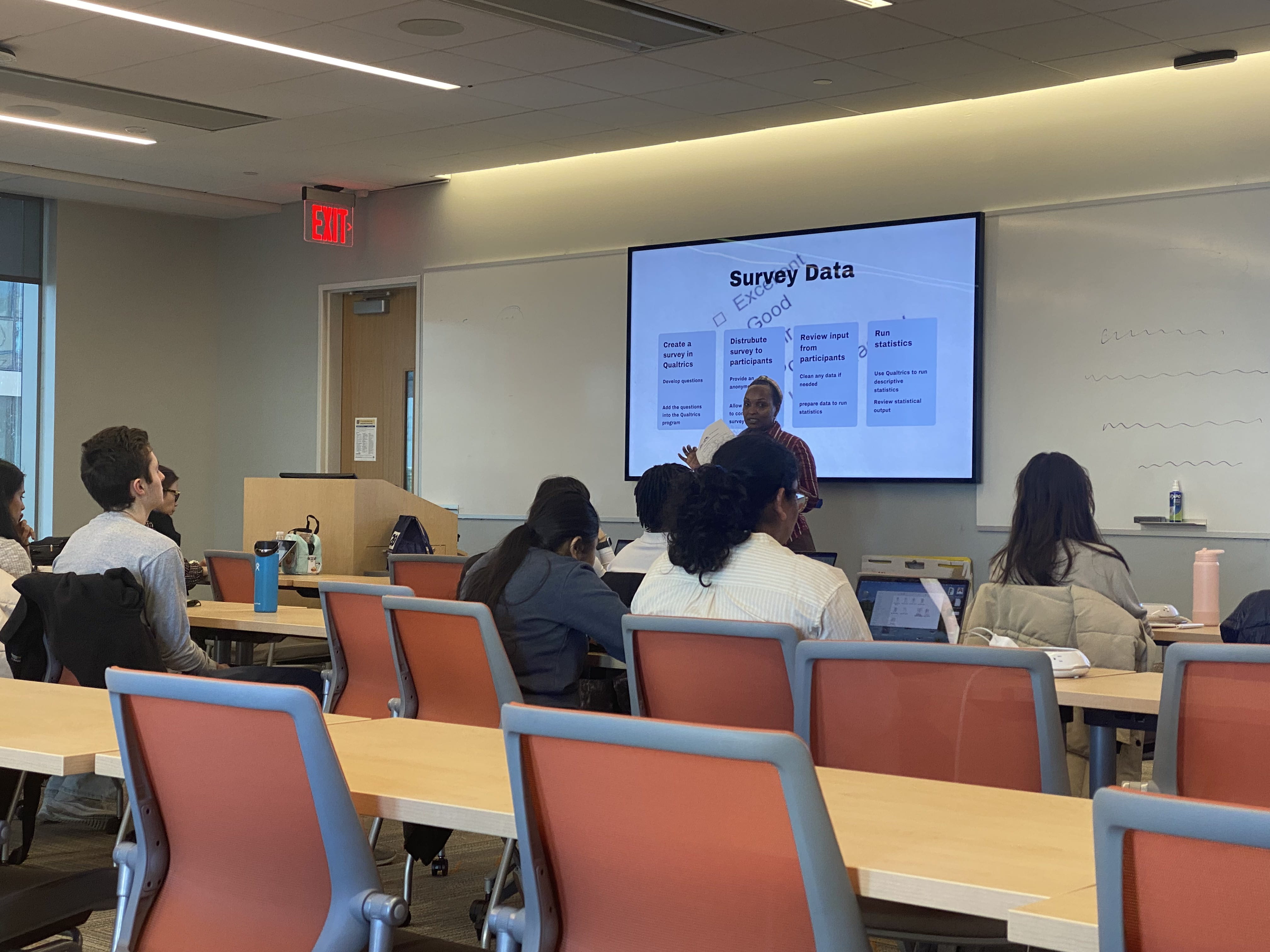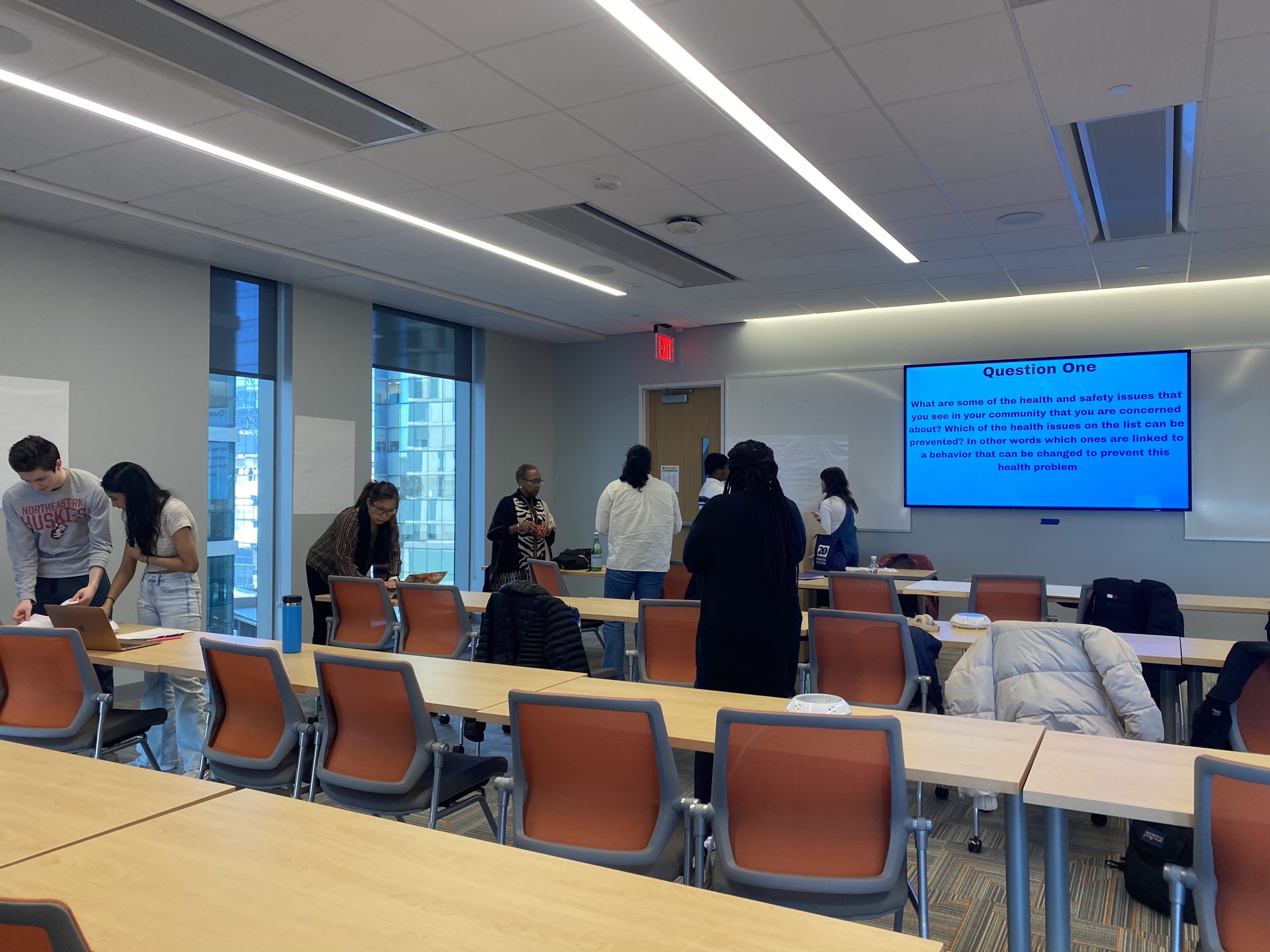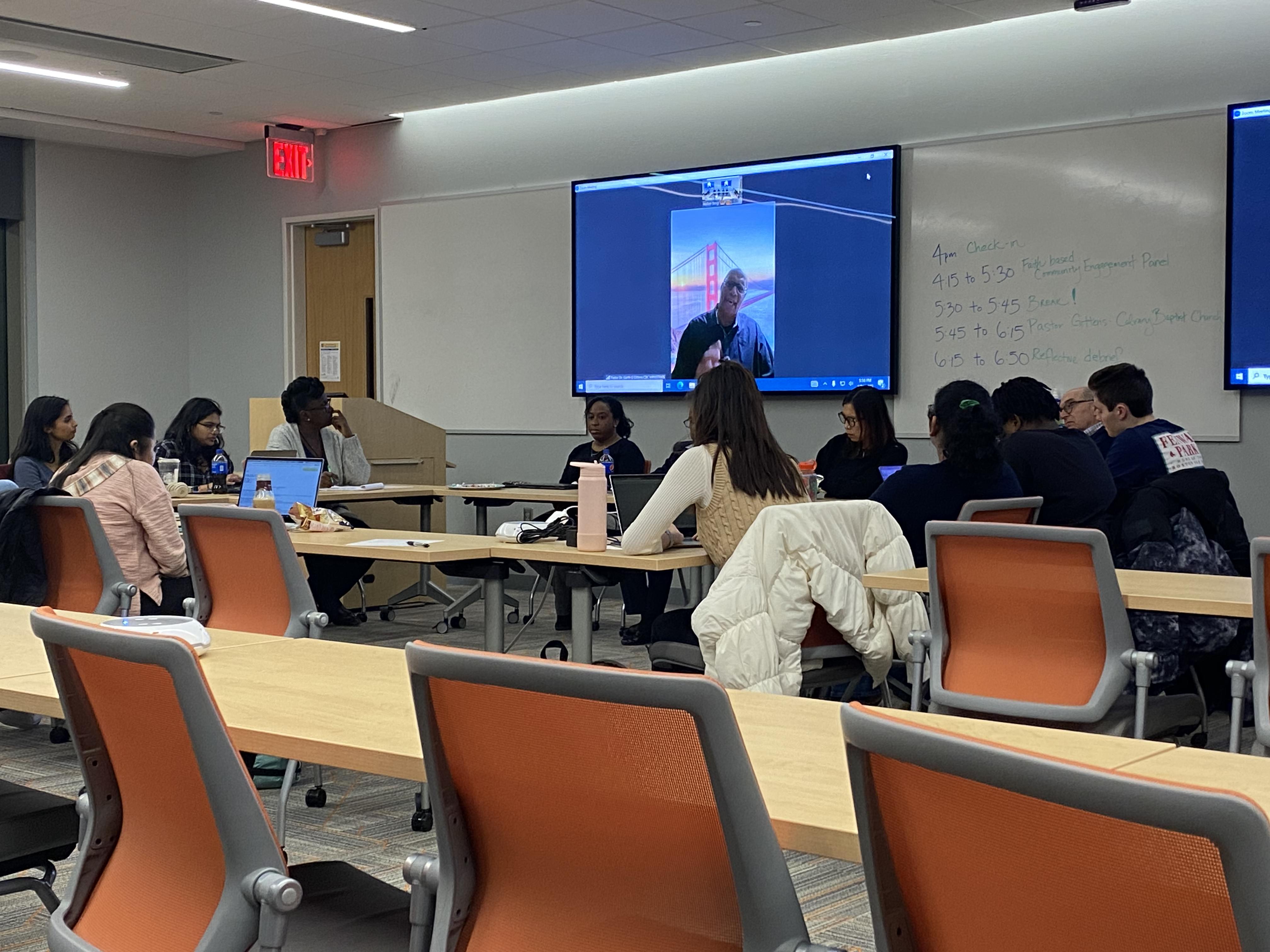Drexel, Main Line Health Course Engaged West Philadelphia on Needs for Proposed Clinic
By: Natalie Kostelni

A new course completed in the winter term at the College of Nursing and Health Professionals (CNHP) highlights the role partners from outside of the University have in fostering experiential learning opportunities that can be applied to improve community health and well-being.
Drexel University collaborated with Main Line Health and Calvary Baptist Church on the interprofessional course, “Community Engagement: Listening to Community Voices to Promote Health Equity — An Accelerated Course in Theory and Practicum.” The course explored how engaging with community residents can provide important insights into the services and programming needed to reduce social injustice and improve health equity and health outcomes.
The class also offered another avenue for the University to work closely with its West Philadelphia neighbors and bring its civic engagement mission into academic spaces. For many students, the experience left a lasting impact and provided new perspectives and inspiration for their future studies.

“It was honestly, from the bottom of my heart, one of the best experiences I have had,” said Asha Chandaka, a fourth-year senior majoring in biology.
This CNHP course was co-sponsored by the Pennoni ‘s Honor’s College and the College of Medicine. Calvary Baptist and Main Line Health’s Together for West Philadelphia Initiative, a partnership of organizations across the region focused on equitable care and opportunity is accessible to everyone, was also involved in co-sponsoring the course.
Loretta Sweet Jemmott, PhD, professor of nursing at CNHP and Drexel’s vice president of health and health equity, co-designed the course with Barry Mann, MD, system medical director for health equity at Main Line Health.
Jemmott co-taught the course with: Helen L. Teng, PhD, assistant clinical professor in undergraduate nursing; Monica J. Harmon, executive director at the Community Wellness HUB in the Dornsife Center for Neighborhood Partnerships and assistant clinical professor for undergraduate nursing; Annette B. Gadegbeku MD, associate professor and associate dean, community health at the College of Medicine; and Mann from Malin Line Health.
Guest lecturers included representatives from community stakeholders active in Together for West Philadelphia, and faculty from CNHP and the School of Public Health. Representatives from West Philadelphia churches also took part in the course.
Jemmott sits on the board of Together for West Philadelphia as does a representative from Cavalry Baptist, which was central to the course. Drexel and Main Line Health are in the very early stages of partnering with Calvary Baptist to design a 39,000-square-foot primary care clinic that could one day be developed on land owned by the church. What services and programs could eventually be housed in the center was central to the course.
Students were taught a 12-step community outreach and engagement technique developed by Jemmott, which she cultivated as part of her work in the West Philadelphia Promise Zone, which is a 2-square-mile area bounded by 48th Street, the Schuylkill River, Girard Avenue and Sansom Street. Jemmott’s work with the Promise Zone led to the development of the CNHP’s Community Wellness HUB at the Dornsife Center for Neighborhood Partnerships at 3509 Spring Garden St. Jemmott’s Promise Zone experience was also instrumental to informing course content.
The classroom work laid the foundation for the students to go out and hear directly from residents of the community about their priorities for the proposed health center. The community surrounding Calvary Baptist, which is located at 62nd Street and Haverford Avenue, was the area of focus for the students.
“You have to go into the community and find out what they need,” said Barry Mann, MD, of Main Line Health who also chairs Together for West Philadelphia.
“This is all about community engagement, listening, and giving voice to the voiceless,” Jemmott said.

As part of building those skills to engage and listen to residents, one class focused on hearing from community leaders including the Rev. Joe Nock of the Second Antioch Baptist Church, the Rev. Malcolm T. Byrd, president and CEO of ForumPhilly, and the Rev. Garth Gabriel Gittens of Calvary Baptist, among others. Each provided advice and insights on how to approach a community that has been disenfranchised and remains skeptical of medical institutions.
Gittens explained how historically churches have served as the center of Black communities, playing important roles beyond being a place of worship. The goal of the new medical center is to provide health services to that community. “There has been a desert for good medical care in West Philadelphia,” he said.
Prior to conducting field work, students learned about ways to build trust and were advised by community leaders to “bring an open mind and be prepared to work.” These suggestions served as building blocks to community engagement and outreach.
Students put what they learned to practice in late February when they visited Calvary Baptist. “They were anxious and nervous at first,” Jemmott said about the students. “They had to conduct community engagement and outreach activities such as walking around the various neighborhoods, talking with residents, and inviting them to participate in community conversations. Once they got out there, those feelings were replaced with excitement. It has been amazing for all of us to work on a project like this.”
Sixty residents participated in eight community conversations led by the students. This provided students with information on residents’ health concerns and what they sought in the proposed medical center.
The ability to directly engage in the community where Drexel is located and to learn from a variety of professors drew Alexandra Goodin, a psychology major poised to graduate in 2025, to take the course.
“It was a really good experience. I was definitely apprehensive going into this experience and doing people-based work changed my idea of what community engagement can be,” Goodin said. “This type of work can have such an impact on a community and I found it such a cool experience to be part of a class that was promoting real change and wasn’t just a lecture.”
Mental health, violence, substance abuse, heart disease, cancer, diabetes, nutrition, dental and eye care, along with parenting classes for teen parents and support groups for new mothers and fathers were among the needs residents shared with the students. Aside from access, other barriers to adequate medical care included mistrust and a lack of affordable transportation to get to medical appointments and misconceptions or anxiety from men on how to address their own health needs, which then prevents them from seeing health care providers.
“I really learned a lot about how much people’s lives can be effected by a lack of resources,” said Monisha Gupta, a third-year student majoring in chemistry. “It’s amazing how much data we collected through one day of outreach.”
Biology major Chandaka was inspired to take the class after seeing how the pandemic affected the mental and overall health of so many people and found the class taught her more about the social determinants of health. The course and, particularly the direct community engagement, left her exhilarated. “It was such a great experience, I remember calling my parents and talking to them about it for two hours,” she said.
The course is an example of the work facilitated by the Innovation Engine, an initiative in the Provost’s Office focused on convening colleges and partners from outside of the University around interdisciplinary, experiential learning opportunities that address real world challenges. As an Engine course, it was facilitated by the Drexel Solutions Institute, which provides support and manages partner relationships across the University.
Course Highlights
Partner: Main Line Health, Calvary Baptist Church
Innovation: New course focused on community engagement and original teaching process
Experiential Learning: Community outreach and fieldwork
Interdisciplinary: Teachers from the College of Nursing and Health Professionals, Dornsife School of Public Health, and the College of Medicine participated as well as students from a range of majors
Areas of Excellence & Opportunity: Health Innovation; Urban Futures; Health Equity and Wellness
Note: Drexel’s interaction with Calvary Baptist Church is solely in its capacity as a convener of the community and does not indicate an endorsement of its religious mission or beliefs.